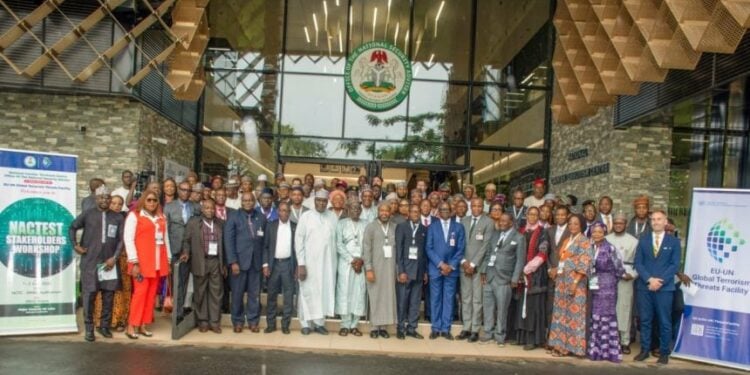The federal government of Nigeria has strengthened its counterterrorism framework with the Revised National Strategy.
The National Counter Terrorism Centre (NCTC), in a significant step towards enhancing national and regional security, convened a high-level workshop on Tuesday to review and validate the revised national counterterrorism strategy (NACTEST).
The NACTEST was first developed in 2015 and revised in 2016. It has guided national efforts in the fight against terrorism for nearly a decade.
In his remarks at the opening ceremony, the national coordinator of NCTC, Maj.-Gen. Adamu Laka said the evolving nature of security threats and the changing tactics of terrorist groups had made it increasingly clear that a comprehensive update of this strategy is long overdue.
He stressed the need for a framework that incorporates both new threats and hard-won operational lessons.
He said, “However, given the dynamic and ever-evolving nature of the security landscape, it has become increasingly clear that a comprehensive review and update of this strategy are long overdue.
“This is necessary to ensure it reflects emerging threats, the evolving tactics of terrorist organisations, and the invaluable lessons learned from our counterterrorism operations over the years.
“Sequel to the expert review and the contributions made during the several stakeholders’ meetings, we now have a consolidated draft of the revised NACTEST.”
Laka said the review work received valuable input from a wide range of stakeholders, including ministries, departments, agencies, civil society organisations, and international partners.
According to him, this wide array of perspectives has been instrumental in producing a draft strategy that is robust, inclusive, fully aligned with international best practices and will stand the test of time.
He said the review came at a particularly important time. Following President Bola Tinubu’s declaration, the centre was transitioning into a Regional Centre of Excellence for Counterterrorism in West Africa and the Sahel.
He stated that the transition underscored Nigeria’s leadership and commitment to regional security, adding that a strategy that meets Nigeria’s needs and also sets a benchmark for the region was needed.
“This workshop is also carefully designed to ensure active participation and collective ownership of the revised strategy.
“Let us remain guided by the two foundational pillars of our counterterrorism approach: the Whole-of-Government and Whole-of-Society strategies.
“These pillars remind us that terrorism is not only a security challenge but also a social and ideological one, requiring the combined efforts of government institutions and society at large,” he added.
In his remarks, NCTC director of policy and strategy Commodore Ahmad Madawaki said significant progress had been made in developing the counterterrorism strategy through a collaborative approach.
Madawaki said the approach was built on two fundamental pillars: Whole-of-Government and Whole of Society.
According to him, the whole-of-government approach ensures that our counterterrorism efforts are coordinated, comprehensive, and effective, while the whole-of-society approach engages communities, civil society organisations, and the private sector in building trust, promoting social cohesion, and countering extremist ideologies.
“As we review and finalise the draft strategy, we must ensure that it meets legal and international requirements, including human rights, gender and humanitarian law.
“We will also incorporate all national, regional and international legislations that relate to terrorism.
“Our strategy must address the current security challenges and ensure that all ministries, departments, and agencies understand their roles and responsibilities in implementing it.



